A
Auto Express
Guest
This is the new Jaguar XF. The thorough overhaul to the BMW 5 Series rival introduces mild-hybrid technology, the brand’s latest infotainment setup and several styling tweaks.
From the outside, the changes are subtle. The front gets a new bumper, which features deeper, wider vents - a change which Jaguar says emphasise the car’s width. Above it sits a reprofiled grille with a new insert, and while the headlights remain the same shape as before, they now feature LED tech as standard.
As before, the XF is offered in both saloon and estate-bodied “Sportbrake” shapes. Both versions get a revised rear bumper, while the saloon features smoked tail lights.
Inside, the changes are much more significant, with much of the refreshed design a result of significant upgrades to the XF’s in car tech. The centre console has been completely redesigned, with a new 11.4-inch curved glass touchscreen as its centrepiece. This controls Jaguar’s Pivi Pro infotainment system, which features sharper, brighter graphics and a slicker user interface, transferring most major navigation, climate and audio functions onto the main display.
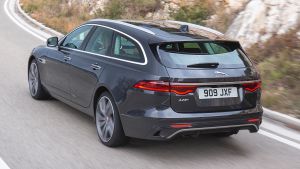
image
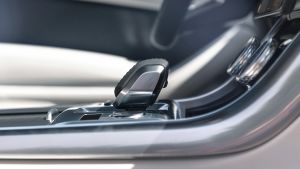
image
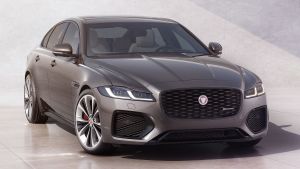
image
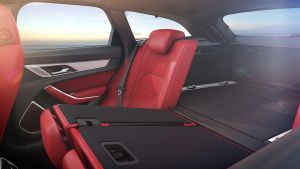
image
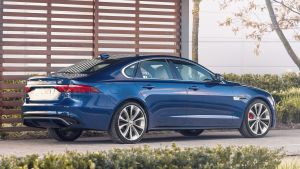
image
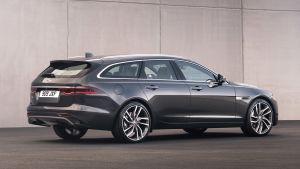
image
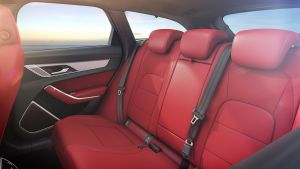
image
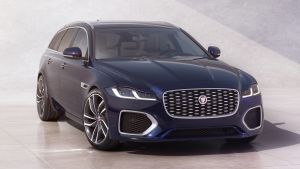
image
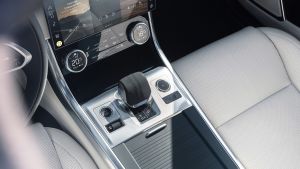
image
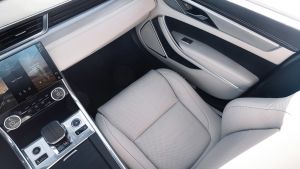
image
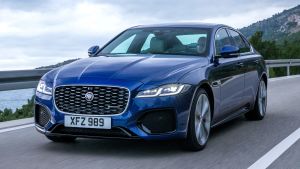
image
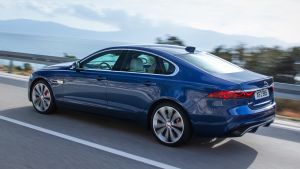
image
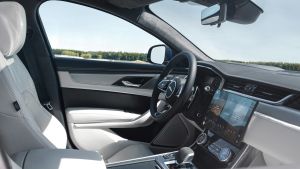
image
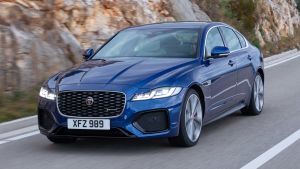
image
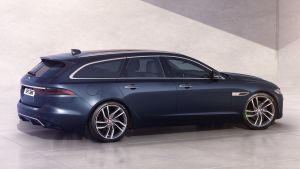
image
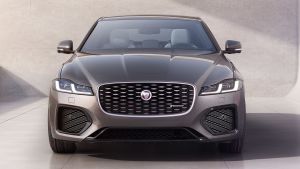
image

image
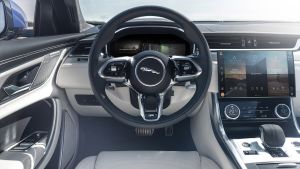
image
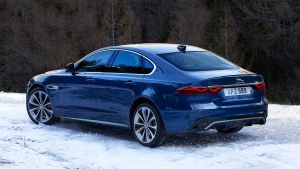
image
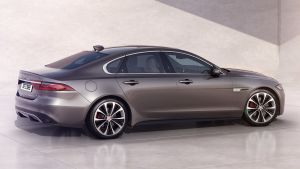
image
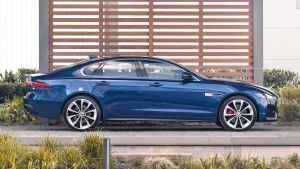
image
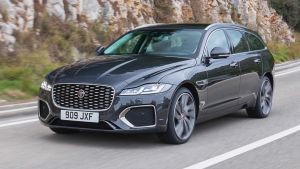
image
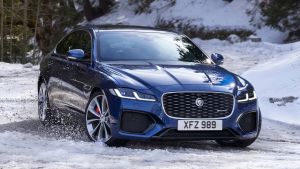
image
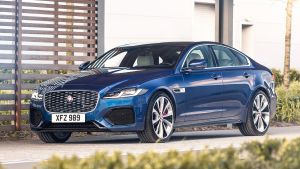
image
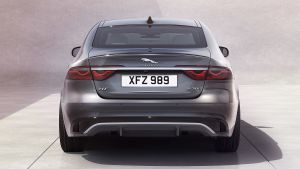
image
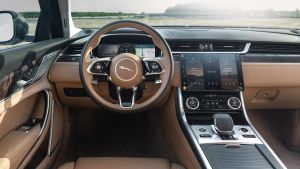
image
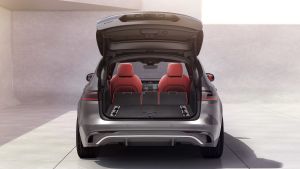
image
The system also features a dual sim setup; not only does this mean that the roaming sims ensure the best connection possible, but functions like streaming and Jaguar’s over-the-air update system can operate simultaneously without any loss in performance. Apple CarPlay and Android Auto are both standard, while smartphone charging can be performed wirelessly.
Ahead of the driver, the XF gets a new steering wheel design which controls functions on the new 12.3-inch digital driver’s display. Active noise cancellation is also introduced to the XF range - this detects drone from road noise and pipes out a sound of opposing wavelength through the interior speakers, promising a quieter, more refined cabin; and the introduction of the ‘ClearSight’ digital rear view display offers improved visibility behind - though if buyers would rather a regular mirror, it’s a flick of a switch away. Finally, the cabin gains new wood trim and upholstery options.
Buyers are offered a choice of one diesel and two petrol engines. The diesel features mild-hybrid technology, which Jaguar says helps to contribute to fuel consumption of 57.2mpg and emissions of 131g/km in official tests. It’s more powerful too, developing 201bhp.

image

image

image

image

image

image

image

image

image

image

image

image

image

image

image

image

image

image

image

image

image

image

image

image

image

image

image
Petrol options consist of a pair of two-litre petrols; the four-cylinder units produce 247bhp and 296bhp respectively, enough for 0-62mph times of 6.5 and 5.8 seconds. All versions get an eight-speed automatic transmission, with drive sent to the rear wheels in the lower powered petrol, and to all four wheels in the 296bhp unit. Diesel buyers get a choice of rear- or all-wheel drive - the latter adding £1,645 to the asking price.
Prices for the XF range start from £32,585 for the rear-wheel drive diesel saloon in S trim. Standard equipment includes 18-inch alloy wheels, leather seats (electrically adjustable in the front), two-zone climate control, the Pivi Pro infotainment system, a 360-degree parking camera, lane keep assist, and traffic sign recognition. An SE model is available in the Sportbrake only: the estate model costs from £37,735, but also adds 19-inch wheels, adaptive high beam LED lights, keyless entry and a powered tailgate.
A more sporty-looking R-Dynamic trim is offered in S, SE and HSE trims. The specs of the first two largely match the kit levels of the regular S and SE trims, while the HSE gets 20-inch wheels, an upgraded leather upholstery, a Meridian sound system, and blind spot assist. A top-spec P300 petrol, all-wheel drive saloon costs £44,760. Like-for-like, the Sportbrake costs £1,850 more than the saloon.
What does the facelifted Jaguar XF have to beat? Here’s our list of the best executive cars on sale now…
Continue reading...
From the outside, the changes are subtle. The front gets a new bumper, which features deeper, wider vents - a change which Jaguar says emphasise the car’s width. Above it sits a reprofiled grille with a new insert, and while the headlights remain the same shape as before, they now feature LED tech as standard.
- SEE MORE Best executive cars 2020
As before, the XF is offered in both saloon and estate-bodied “Sportbrake” shapes. Both versions get a revised rear bumper, while the saloon features smoked tail lights.
Inside, the changes are much more significant, with much of the refreshed design a result of significant upgrades to the XF’s in car tech. The centre console has been completely redesigned, with a new 11.4-inch curved glass touchscreen as its centrepiece. This controls Jaguar’s Pivi Pro infotainment system, which features sharper, brighter graphics and a slicker user interface, transferring most major navigation, climate and audio functions onto the main display.

image

image

image

image

image

image

image

image

image

image

image

image

image

image

image

image

image

image

image

image

image

image

image

image

image

image

image
The system also features a dual sim setup; not only does this mean that the roaming sims ensure the best connection possible, but functions like streaming and Jaguar’s over-the-air update system can operate simultaneously without any loss in performance. Apple CarPlay and Android Auto are both standard, while smartphone charging can be performed wirelessly.
Ahead of the driver, the XF gets a new steering wheel design which controls functions on the new 12.3-inch digital driver’s display. Active noise cancellation is also introduced to the XF range - this detects drone from road noise and pipes out a sound of opposing wavelength through the interior speakers, promising a quieter, more refined cabin; and the introduction of the ‘ClearSight’ digital rear view display offers improved visibility behind - though if buyers would rather a regular mirror, it’s a flick of a switch away. Finally, the cabin gains new wood trim and upholstery options.
Buyers are offered a choice of one diesel and two petrol engines. The diesel features mild-hybrid technology, which Jaguar says helps to contribute to fuel consumption of 57.2mpg and emissions of 131g/km in official tests. It’s more powerful too, developing 201bhp.

image

image

image

image

image

image

image

image

image

image

image

image

image

image

image

image

image

image

image

image

image

image

image

image

image

image

image
Petrol options consist of a pair of two-litre petrols; the four-cylinder units produce 247bhp and 296bhp respectively, enough for 0-62mph times of 6.5 and 5.8 seconds. All versions get an eight-speed automatic transmission, with drive sent to the rear wheels in the lower powered petrol, and to all four wheels in the 296bhp unit. Diesel buyers get a choice of rear- or all-wheel drive - the latter adding £1,645 to the asking price.
Prices for the XF range start from £32,585 for the rear-wheel drive diesel saloon in S trim. Standard equipment includes 18-inch alloy wheels, leather seats (electrically adjustable in the front), two-zone climate control, the Pivi Pro infotainment system, a 360-degree parking camera, lane keep assist, and traffic sign recognition. An SE model is available in the Sportbrake only: the estate model costs from £37,735, but also adds 19-inch wheels, adaptive high beam LED lights, keyless entry and a powered tailgate.
A more sporty-looking R-Dynamic trim is offered in S, SE and HSE trims. The specs of the first two largely match the kit levels of the regular S and SE trims, while the HSE gets 20-inch wheels, an upgraded leather upholstery, a Meridian sound system, and blind spot assist. A top-spec P300 petrol, all-wheel drive saloon costs £44,760. Like-for-like, the Sportbrake costs £1,850 more than the saloon.
What does the facelifted Jaguar XF have to beat? Here’s our list of the best executive cars on sale now…
Continue reading...
